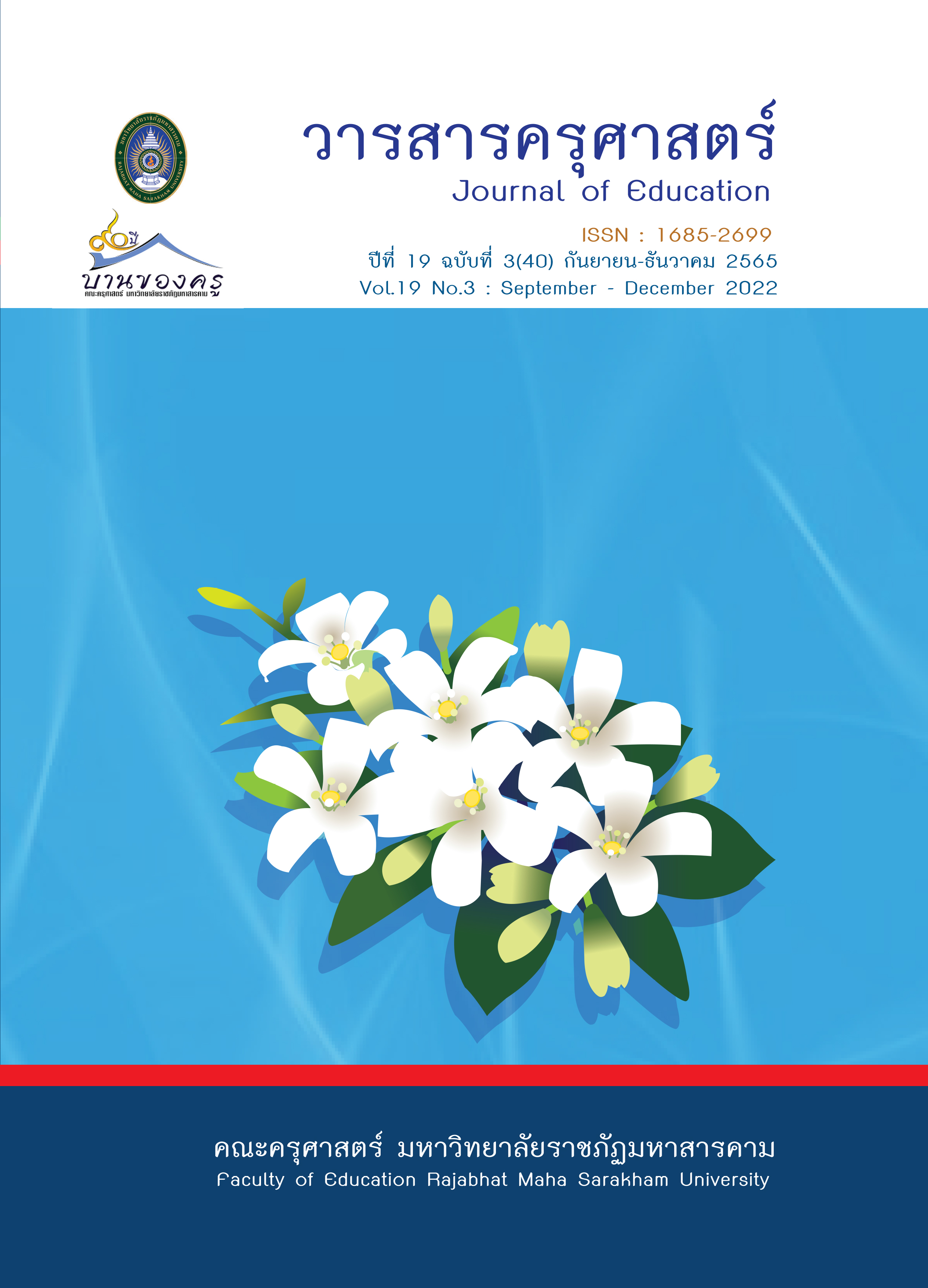The Teachers' Learning Management Competency Enhancement with Using Professional Learning Community at Setthabutbamphen School
Main Article Content
Abstract
The research objectives were to 1) Study the teachers’ learning management competency current states and desirable states by using the PLC model, 2) Develop the PLC model for teachers’ competency enhancement, 3) Study the result of the model, and 4) Assess the model. The research instruments used the 1) PLC current states and desirable states survey, 2) The PLC assessment form for the experts, 3) The PLC manual assessment form, 4) A teachers’ learning management form, 5) Teachers’ ability assessment form, and 6) The appropriation and benefit of the model. The sample of the research consisted of 151 teachers and staffs in, Setthabutbamphen School. The sample used the purposive sampling. The statistics were percentage, mean,
and standard deviation and the research data analyzed by using descriptive statistics.
The result of the research were as follow; 1) The overall for the current states study was at moderated level, and the desirable states was at high level. 2) The result of the model development and the form assessment consisted of five features; principal, objectives, content, procedures, assessment and evaluation, and accuracy were at high level. 3) The result of the model implement was at the highest level after using the model. 4) The result of the model assessment was at high level. 5) The overall for the model appropriateness and its advantages were at high and the highest level respectively.
Article Details

This work is licensed under a Creative Commons Attribution-NonCommercial-NoDerivatives 4.0 International License.
ข้อกำหนดเบื้องต้นที่ผู้นิพนธ์(ผู้ส่งบทความ) ควรทราบ
1. ผู้นิพนธ์ที่ประสงค์จะลงตีพิมพ์บทความกับวารสาร ตั้งแต่เดือนมกราคม 2563 เป็นต้นไป ให้ใช้รูปแบบใหม่ (Template 2563) โดยสามารถดูตัวอย่างได้ที่เมนู GUIDELINES
2. จะตีพิมพ์และเผยแพร่ได้ ต้องผ่านการประเมินจากผู้ทรงคุณวุฒิ (Peer Review)
3. การประเมินบทความโดยผู้ทรงคุณวุฒิ (Peer Review) เป็นแบบ Double Blind
4. การอ้างอิงบทความใช้หลักเกณฑ์ APA (American Psychological Association) คลิก
5. บทความถูกปฏิเสธการตีพิมพ์ ไม่ผ่านการประเมิน ผู้นิพนธ์ขอยกเลิกเองหรือชำระเงินก่อนได้รับการอนุมัติ ทางวารสารไม่มีนโยบายการคืนเงิน
References
ชูชาติ มงคลเมฆ. (2561). การพัฒนารูปแบบการพัฒนาสมรรถนะครูแบบมีส่วนร่วมของโรงเรียนใน
สังกัดสำนักงานเขตพื้นที่การศึกษามัธยมศึกษา เขต 3 {วิทยานิพนธ์ปริญญาดุษฎีบัณฑิต ไม่ได้ตีพิมพ์]. มหาวิทยาลัยราชภัฏพระนครศรีอยุธยา.
บังอร เสรีรัตน์. (2559). การพัฒนารูปแบบการจัดกิจกรรมเสริมหลักสูตรเพื่อส่งเสริมความสามารถ
ในการคิดวิเคราะห์ของนักเรียนชั้นมัธยมศึกษาปีที่ 3 ในกรุงเทพมหานคร [วิทยานิพนธ์ปริญญาดุษฎีบัณฑิต
ไม่ได้ตีพิมพ์]. จุฬาลงกรณ์มหาวิทยาลัย.
บุญชม ศรีสะอาด. (2553). การวิจัยเบื้องต้น (พิมพ์ครั้งที่ 8). สุวีริยาสาส์น.
โรงเรียนเศรษฐบุตรบำเพ็ญ. (2563). รายงานการประเมินตนเอง 2563. โรงเรียนเศรษฐบุตรบำเพ็ญ.
วิจารณ์ พานิช. (2555). วิถีสร้างการเรียนรู้เพื่อศิษย์ในศตวรรษที่ 21. มูลนิธิสดศรีสฤษดิ์วงศ์.
วิโรจน์ สารรัตนะ. (2557). กระบวนทัศน์ใหม่ทางการศึกษา ; กรณีนานาทัศนะการศึกษาศตวรรษที่ 21.
สำนักพิมพ์ซีเอ็ดบุ๊คเซ็นเตอร์.
ศิริสุภา เอมหยวก. (2556). การพัฒนารูปแบบการเสริมสร้างสมรรถนะวิชาชีพครูบรรณารักษ์ห้องสมุดโรงเรียน
[วิทยานิพนธ์ปรัชญาดุษฎีบัณฑิต]. มหาวิทยาลัยราชภัฏพิบูลสงคราม.
พิชิต ขำดี. (2561). ศึกษาแนวทางการส่งเสริมการเป็นชุมชนแห่งการเรียนรู้ทางวิชาชีพสำหรับโรงเรียนขนาดเล็ก
จังหวัดพระนครศรีอยุธยา [วิทยานิพนธ์ปริญญามหาบัณฑิต]. มหาวิทยาลัยเทคโนโลยีราชมงคล.
สรปรัชญ์ ไวกสิกรณ์. (2562). รูปแบบการบริหารเพื่อเสริมสร้างสมรรถนะการวัดและประเมินผล
การเรียนรู้ของครู ตามแนวทางของสถาบันทดสอบการศึกษาแห่งชาติ (องค์การมหาชน)
ในโรงเรียนมัธยมศึกษา {วิทยานิพนธ์ปรัชญาดุษฎีบัณฑิต}. มหาวิทยาลัยนอร์ทกรุงเทพ.
สำนักงานเลขาธิการสภาการศึกษา. (2559). การพัฒนามาตรฐานการศึกษาของต่างประเทศ.
สำนักงานเลขาธิการสภาการศึกษา.
สุภาพ คำวาง. (2559). ศึกษากระบวนการพัฒนาวิชาชีพครูสู่ความเป็นชุมชนแห่งการเรียนรู้ทางวิชาชีพของกลุ่ม
เครือข่ายพัฒนาการศึกษาท้องถิ่นเชียงรายโซนเหนือจังหวัดเชียงราย. รายงานการวิจัยโรงเรียนเทศบาล 1
(วัดพรหมวิหาร).
อุทุมพร จามรมาน. (2549). โมเดล. วารสารวิชาการ, 1(2), 22-26.
DuFour, R. (2007). “Professional Learning Communities: A Bandwagon, an Idea Worth Considering, or Our Best
Hope for High Levels of Learning”. Middle School Journal (J1), 39(1), 4-8.
Eisner, E. (1976). “Education Connoisseurship and Criticism: Their Form and Functions in Educational Evaluation.”
Journal of Aesthetic Education, 192-193.
Hord, S.M. (1997). Professional Learning Communities : Communities of Inquiry and Improvement. Austin :
Southwest Educational Development Laboratory.
Stufflebeam, D.L. (2008). The CIPP model for evaluation. In Faculty Education. Naresuan University. International
Seminar on New Directions in Educational Research, Measurement and Evaluation: The 16th Thailand
Education Research, Measurement and Evaluation Get-together. Naresuan University.


